
“Elle travaille de la cafetière!”
“Ah, occupe-toi de tes oignons.”
“Mais, elle pédale dans la choucroute….ça tourne au vinaigre.”
“Oh, purée, mon petit chou. Quelle salade!”
“Bien, bien…les carottes sont cuites.”
You may wonder if I am working from my coffee pot or pedaling in sauerkraut….another post on food? You thought this blog was about France. Ah, mais oui, it is about France; but, in France, mes canards, it’s all about food!
Let’s face it: The French are obsessed with food. Debates are passionate about the best restaurant in the village, the best baguette in town, and where to buy the best saucisson de sanglier. Heated discussions are inspired over whether a chef really deserves the coveted Michelin star? There is more concern about the decline in a chef’s cuisine than about her affair (that all agree is causing the decline!). That the chef’s soufflé has been flat since his wife left him is elevated to a crisis in the talk of the town. We are warned that the crust on the baguette is too soft at that boulangerie! We are advised to drive several villages away – to the “best” boucherie – to buy our meat (and we did it and they were right!). One year, people argued endlessly about whether the local truffière in a neighboring village had secretly imported his truffles from Spain. Pasteurized chêvre? Jamais!
It really should be no surprise that words related to food have found their way into well known French expressions.
| Mike Dater http://www.mikedater.com/ |
A few years ago, my French teacher, Janine Kolb, and I began compiling a list of such expressions. Friends contributed to our list; I especially thank Brian Smith whom I met in a French immersion class in Moustieres-Sainte-Marie some years ago. I mentioned this list while attending a recent luncheon of the International Women’s Club and everyone wanted to know more.
We enlisted our friend and talented local artist, Mike Dater, to illustrate a few of these expressions et voilà!
Enjoy and please send us your contributions (and tell me I was not une nouille to post this list!)
Elle pédale dans la choucroute—she pedals in the sauerkraut (she doesn’t understand diddly squat)
Le cul bordé de nouilles—your rear end is surrounded by noodles (you’re extremely lucky)
Maigre comme un haricot—skinny as a string bean
Faire du blé—to make money/earn some dough
Bon comme du bon pain—good like good bread
Regardez ce quart de Brie—look at that quarter of Brie (look at that big nose)
De l’oseille—some serious sorrel (plenty of money)
Je pourrais manger un curé frotté d’ail—I could eat a parish priest rubbed with garlic (I could eat a horse)
Oh, purée!—Oh, mashed potatoes! (Oh, darn!)
Je peux manger ma soupe sur ta tête—I can eat my soup on your head (I’m a head taller than you)
Courgette—zucchini (head)
Cafetière—coffepot (head)
Elle travaille de la cafetière—she’s working from her coffee pot (she’s a bit out of it)
Occupe-toi de tes oignons—mind your own onions (mind your own business)
Oignons—onions (buttocks)
Faire des yeux de merlans frits–make fried marlin eyes (make goo-goo eyes)
Va donc, grand dépendeur d’andouilles!—go ahead, tall unhooker of sausages ! (go ahead, you big lug ! The guy who unhooks the andouilles from the ceiling must be very tall and need not be very smart.)
Tu me fais tourner le sang en boudin—you’re turning my blood into blood sausage (you’re worrying me)
Avoir deux oeufs sur le plat—to have two fried eggs on the plate (to be flat-chested)
Elle a la banane—she has the banana (she’s got a big smile)
Ça met du beurre dans les épinards—that puts the butter in the spinach (that’s icing on the cake)
Tu veux le beurre et l’argent du beurre—you want the butter and the money of the butter (you can’t have your cake and eat it too)
Il sucre les fraises—he’s sugaring his strawberries (he’s old and senile, walking, head bent down, back hunched as if he is literally sprinkling sugar on his strawberry patch)
Tomber dans les pommes—to faint (fall in the apples)
Être une huile—to be a cooking oil (to be high-ranking, a big cheese)
Mettre une pêche—land a peach (punch someone in the face)
Des oreilles en chou-fleur—ears made of cauliflowers (big ears)
Faire des salades—make some salads (tell tales out of school)
Un veau—a veal (a sluggish car)
Appuie sur le champignon—push on the mushroom (step on the gas; the gas peddle of some French cars resembled a mushroom)
En faire tout un fromage—make a total cheese (make a big deal out of something)
Une nouille—a noodle (an idiot)
Quelle nouille!—what an noodle (what an idiot)
En pleine poire—right in the pear (right in the face)
Faire le poireau/poireauter ou poiroter—make the leek (wait impatiently for someone)
Envoyez la sauce—send the sauce (make an effort)
Il a de la brioche—he has some brioche (he has a potbelly)
Elle a un coeur d’artichaut—she has a heart of an artichoke (she’s sentimental)
Grande asperge—a big asparagus (a tall person)
Cracher dans la soupe—to spit in the soup (being overly critical or ungrateful)
Envoyer un marron—send a chestnut (punch someone in the face)
Ça tourne au vinaigre—that’s turning to vinegar (the situation is going badly)
Il n’est pas dans son assiette—he’s not in his plate (he’s not himself)
Je ne suis pas dans mon assiette—I am not in my plate (I’m not feeling myself)
Les carottes sont cuites—the carrots are cooked (it’s too late to do anything about it)
La fin des haricots—the end of the string beans (the biggest deal possible, in a catastrophic way)
Couper la poire en deux—to cut the pear in two (to divide in half)
Quelle poire!—what a pear! (what an idiot!)
Rouge comme une tomate—red like a tomato (blush, to be embarrassed)
Il mange les pissenlits par la racine—he’s eating the dandelions by the root (he’s pushing up the daisies)
Quelle salade!—what salad (what mixed-up information)
J’en mangerais sur la tête d’un pouilleux—I could eat some on the head of someone with lice (when one is so hungry or something smells so good, one might be inspired to say this.)
Je n’ai plus un radis – I don’t have a single radish (I don’t have much money)
C’est bête comme chou – it’s dumb like cabbage (It’s as easy as pie)
Ménager la chèvre et le chou – to accomodate the goat and the cabbage (to play both ends against the middle)
Chou vert et vert chou – cabbage green and green cabbage (six of one and half a dozen of the other)
Cette enfant est très chou – this child is very cabbage (This girl is adorable)
Je me suis empiffré de choux à la crème – I stuffed myself with cream puffs (I ate alot)
Elle lui est vraiment rentré dans le chou – she really put him in the cabbage (she really went for him)
Elle est vraiment un chou – she is really a cabbage (she’s a real honey)

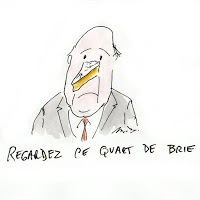
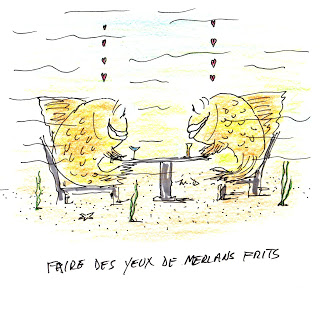

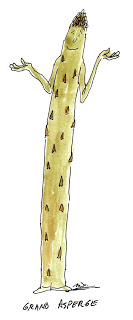
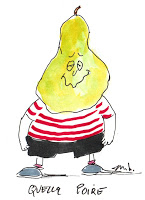
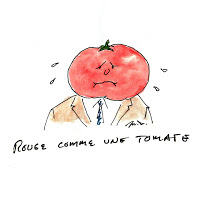





It's always a delight to open my email and find the newest Modern Trobador – memories of times in Provence and anticipation of more in the future. This week, Mr. Dater's illustrations are extraodinary. All of them, though I especially love the "goo-goo eyes". off to visit his website – another great find.
Patti in Fresno
Ah, Patti, merci mon petit chou. You will enjoy Mike's website!
Amitiés,
Susan
Geesh! Who knew there could be SOOOO many expressions I have never heard before! Great compilation – and I adored the drawings.
Hi Linda,
I hope that you are able to work some of these expressions into your conversations when you go to Lourmarin! Thanks so much!
Amitiés,
Susan
These are so much fun! I will have to work hard to add them all to my vocabulary!! The one that stuck immediately is "J'ai de la brioche!" 🙂
David
David,
I don't know how you will work THAT one into your conversations! :~)
Amitiés,
Susan
Wow, if I can remember half of these a year from now, my vocabulary will have tripled! Gin
It's worth a try (although, since I am familiar with your French, Ginny, I know that your calculation about your projected vocabulary is woefully low!).
Amitiés,
Susan
Great list of expressions. You might also add :
Manger la grenouille – to eat the frog (to go bankrupt, to lose money)
Cathy
French online
Hi Cathy,
I love it! Sadly, it is a good one to know these days. I look forward to exploring your website, too. Feel free to post another comment describing your site as I am sure that our readers would be interested in checking it our!
Thanks so much.
Amitiés
Susan
Great list! Merci Beaucoup! I'm recommending this list to my students!
Great list. I gave you a link in my blog. Come check it out sometime
Une autre expression:
"se faire rouler dans la farine"
L’expression de cette semaine « se faire rouler dans la farine » signifie se faire duper ou tromper. On emploie souvent cette expression sous sa forme abrégée en disant qu’une personne s’est fait rouler.
Cette expression date du XIXe siècle. Une personne qui roule dans la farine une autre, utilise des arguments ou des propos fallacieux, menteurs pour arriver à ses fins. Un tel individu est souvent qualifié de beau parleur. L’emploi du mot « farine » est utilisé ici au sens figuré et représente l’usage d’arguments trompeurs. Il était courant pour les acteurs de l’époque de se couvrir de farine pour cacher leur identité lors d’une représentation ce qui explique cette comparaison très appropriée.
En anglais l’expression « se faire rouler dans la farine » signifie littéralement “to get swindled”, “to be taken for a ride”. Elle peut aussi se traduire “to be duped” or “to be deceived”.